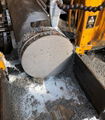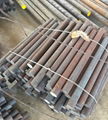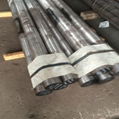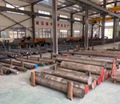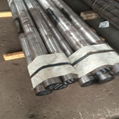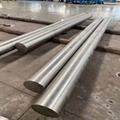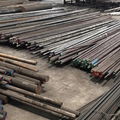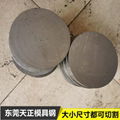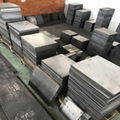| Model: | A2 |
|---|---|
| Brand: | - |
| Origin: | Made In China |
| Category: | Metallurgy , Mining & Energy / Metallurgy & Mining / Other Metallic |
| Label: | A2 Chinese Manufactu , A2 steel , A2 steel |
| Price: |
US $5
/ KG
|
| Min. Order: | 1 KG |
A2 Steel/factory status :HB230-250
A2 is an American high toughness wear-resisting tool steel, belonging to the wind hard section steel. The mass fraction of carbon is about 1%, and the hardness can reach 57~62HRC after heat treatment, and the mass fraction of chromium is about 5%. After grinding, the steel surface luster is dark, corrosion resistance is good, ductility is very strong, and the damage resistance of the cutting edge of the mold is good. The steel has good hardenability, uniform carbide distribution, certain impact and good wear resistance. It has good air quenching performance, small size deformation, uniform and fine carbide and good wear resistance after air quenching.
Steel:
Widely used, variety, according to the different section shape, steel is generally divided into profiles, plates, pipes and metal products four categories. Steel is steel ingot, billet or steel made by pressure processing of a certain shape, size and properties of the material. Most steel processing is through pressure processing, so that the processed steel (billet, ingot, etc.) produce plastic deformation. According to different steel processing temperature, can be divided into cold processing and hot processing two.
Classification of uses:
(1) Structural steel for construction and engineering, referred to as construction steel, refers to steel used for making metal structural parts in construction, Bridges, ships, boilers or other projects. Such as carbon structural steel, low alloy steel, steel and so on.
(2) Structural steel for machinery manufacturing refers to steel used for manufacturing structural parts of machinery and equipment. This kind of steel is basically high quality steel or high quality steel, mainly high-quality carbon structural steel, alloy structural steel, easy to cut structural steel, spring steel, rolling bearing steel and so on.
Generally used to manufacture various tools, such as carbon tool steel, alloy tool steel, high-speed tool steel and so on. According to its use, it can be divided into cutting steel, die steel and measuring steel.
Steel with special properties, such as rust resistant acid steel, heat resistant steel, high resistance alloy, wear resistant steel, magnetic steel, etc.
This is to point to each industrial department specialized use steel, such as automobile steel, agricultural machinery steel, aviation steel, chemical machinery steel, boiler steel, electrical steel, welding rod steel and so on.
A2 is a cold-working die steel improved on the basis of SKD11(Cr12Mo1V1). Under conventional heat treatment conditions, the residual austenite almost completely decomposed, generally can omit cryogenic treatment, and can still maintain high toughness under relatively strong degree.
1. Experimental Design
After 1040 quenching and 520-530 high temperature tempering, A2 hardness HRC up to 60 ~ 62, toughness is twice of Cr12Mo1V1, is the highest in the common cold work die steel, and good machinability, grindability, electrical machining metamorphic layer residual stress is small, residual austenite is very few, carbide fine and uniform distribution.
Due to the complex force of the die, some working parts of the die need to have some special mechanical properties. If the standard heat treatment process can not reach the ideal working performance requirements, it is necessary to adjust the basic characteristics of hardness, toughness and wear resistance through heat treatment, so as to achieve the best working state of the die. Quenching temperature and tempering temperature are the main process parameters of heat treatment. This paper focuses on the tempering characteristics of A2.
Ii. Experimental Design
In the experiment, some changes were made to A2 heat treatment specification, and the quenching temperature was adjusted appropriately. The tempering temperature was set to 6 grades, namely 100, 200, 300, 400, 500, 600. For 100 tempering, 101-2 type drying oven is used for heating, and for the rest, SX-25-12 type box resistance furnace is used for heating. Two samples are taken for each tempering temperature.
Metal Rockwell hardness test was used for hardness test, and hBRVU-187.5 Brinell optical hardness tester was used at room temperature.
The impact test was carried out on JB30B impact testing machine with non-notched samples of 10mm×10mm×55mm, and the impact energy was 0.3kn.m or 0.15kn.m.
